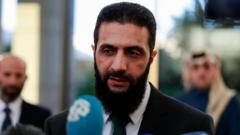The Syrian transitional government’s revisions to the educational curriculum, embodying a more Islamic perspective and erasing references to the Assad era, have sparked alarm among activists, fueling calls for protests ahead of the upcoming school term.
Concerns Emerge Over New Syrian Curriculum Changes Amid Calls for Protest

Concerns Emerge Over New Syrian Curriculum Changes Amid Calls for Protest
As the new school term approaches, the Islamist-led Syrian authorities' proposed curriculum changes are igniting fear and opposition within civil society.
Amid the anticipation of the new school term beginning this Sunday, rising concerns are surfacing in Syria due to the proposed changes to the school curriculum by the newly formed Islamist-led authorities. Critics argue that these changes have been enacted without proper consultation from broader society. The transitional government's education ministry has outlined a curriculum poised to adopt a more Islamic tone and has eliminated references to the Assad regime across all academic subjects.
For instance, the phrase “Defending the nation” has been replaced with “Defending Allah.” Education Minister Nazir al-Qadri sought to mitigate anxieties, asserting that the curriculum remains fundamentally unchanged until special committees are established to review it. Nonetheless, significant subject matter changes have been flagged, including the exclusion of Evolution and the Big Bang theory in scientific teachings, and the removal of references to pre-Islamic gods and their revered statues.
The legacy of Queen Zenobia, an iconic figure of Syria's ancient history, has seemingly been underrepresented. Furthermore, works reflecting upon the Assad family’s rule, including poetry in Arabic classes, have been entirely expunged. Al-Qadri insists that directives regarding curriculum changes are mainly aimed at removing content that glorifies the "defunct Assad regime," with promises that materials would feature the revolutionary Syrian flag prominently.
While some within Syria have expressed support for the changes, civil society activists — many of whom have recently returned to the country after significant absences — are raising alarms. They fear that the unilateral curriculum adjustments signal a disregard for diverse voices, and they plan to protest the administration's attempts to alter the education sector without inclusive dialogues across different societal groups.
The transitional government has pledged to pursue a National Dialogue Conference and has engaged various communities, including Christians and Kurds, in discussions about the country’s prospective future. However, many activists argue that the recent changes to the educational system undermine these promises of collective representation and involvement, emphasizing the need for inclusive governance that embodies the principles of freedom and openness following the ousting of Bashar al-Assad.



















